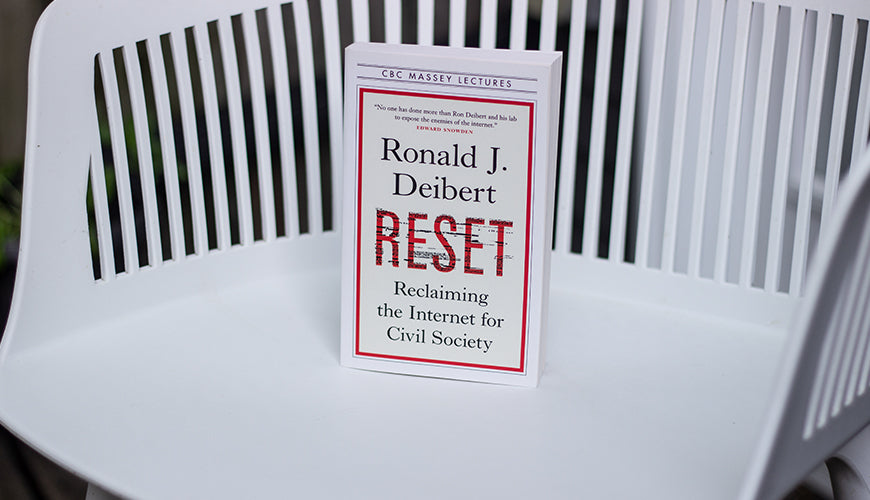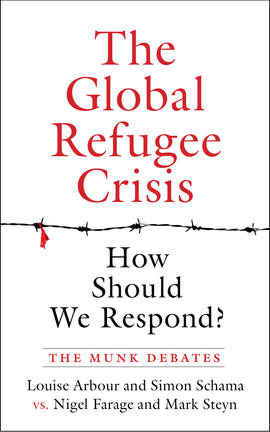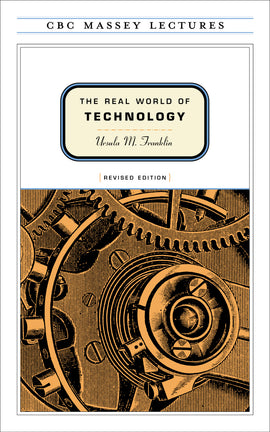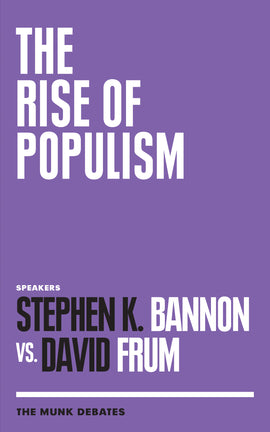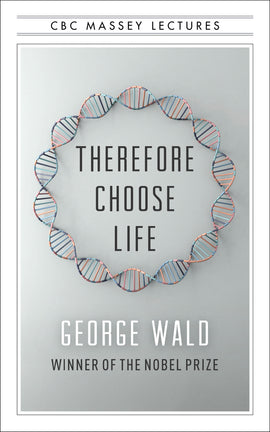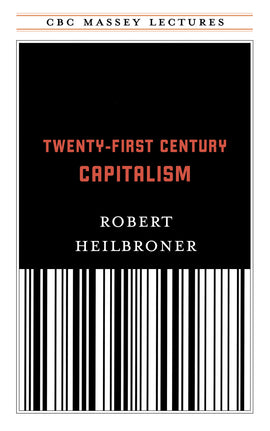Quick View
{"id":6814248239163,"title":"Therefore Choose Life","handle":"therefore-choose-life","description":"\u003cp\u003e\u003cstrong\u003eThis recently discovered and very timely 1970 Massey Lectures by Nobel Prize-winning scientist George Wald, now in print for the first time ever.\u003c\/strong\u003e\u003c\/p\u003e\u003cp\u003eWhere did we come from, who are we, and what is to become of us — these questions have never been more urgent. Then, as now, the world is facing major political and social upheaval, from overpopulation to nuclear warfare to environmental degradation and the uses and abuses of technology. Using scientific fact as metaphor, Nobel Prize–winning scientist George Wald meditates on our place, and role, on Earth and in the universe. He urges us to therefore choose life — to invest in our capabilities as human beings, to heed the warnings of our own self-destruction, and above all to honour our humanity.\u003c\/p\u003e","published_at":"2022-03-24T09:39:44-04:00","created_at":"2022-03-23T13:23:12-04:00","vendor":"House of Anansi Press Inc","type":"","tags":["Adult Environmentalism","Adult Nonfiction","By (author) Wald George","Foreword by Wald Elijah","House of Anansi Press","Introduction by Auerbach Lewis","Massey Lectures","pub date: 2017-09-09","Technology \u0026 Politics","The CBC Massey Lectures"],"price":1495,"price_min":1495,"price_max":1695,"available":true,"price_varies":true,"compare_at_price":null,"compare_at_price_min":0,"compare_at_price_max":0,"compare_at_price_varies":false,"variants":[{"id":40206675902523,"title":"trade paperback","option1":"trade paperback","option2":null,"option3":null,"sku":"9781487003203","requires_shipping":true,"taxable":true,"featured_image":null,"available":true,"name":"Therefore Choose Life - trade paperback","public_title":"trade paperback","options":["trade paperback"],"price":1695,"weight":180,"compare_at_price":null,"inventory_management":"shopify","barcode":"9781487003203","requires_selling_plan":false,"selling_plan_allocations":[]},{"id":40206677606459,"title":"epub","option1":"epub","option2":null,"option3":null,"sku":"9781487003210","requires_shipping":false,"taxable":true,"featured_image":null,"available":true,"name":"Therefore Choose Life - epub","public_title":"epub","options":["epub"],"price":1495,"weight":0,"compare_at_price":null,"inventory_management":null,"barcode":"9781487003210","requires_selling_plan":false,"selling_plan_allocations":[]},{"id":40206678327355,"title":"mobi","option1":"mobi","option2":null,"option3":null,"sku":"9781487003227","requires_shipping":false,"taxable":true,"featured_image":null,"available":true,"name":"Therefore Choose Life - mobi","public_title":"mobi","options":["mobi"],"price":1495,"weight":0,"compare_at_price":null,"inventory_management":null,"barcode":"9781487003227","requires_selling_plan":false,"selling_plan_allocations":[]}],"images":["\/\/houseofanansi.com\/cdn\/shop\/products\/BNCImageAPI_e3915da3-8f9f-44dd-a1f2-523ad2d6820a.jpg?v=1654445865"],"featured_image":"\/\/houseofanansi.com\/cdn\/shop\/products\/BNCImageAPI_e3915da3-8f9f-44dd-a1f2-523ad2d6820a.jpg?v=1654445865","options":["Title"],"media":[{"alt":null,"id":22171010695227,"position":1,"preview_image":{"aspect_ratio":0.625,"height":2400,"width":1500,"src":"\/\/houseofanansi.com\/cdn\/shop\/products\/BNCImageAPI_e3915da3-8f9f-44dd-a1f2-523ad2d6820a.jpg?v=1654445865"},"aspect_ratio":0.625,"height":2400,"media_type":"image","src":"\/\/houseofanansi.com\/cdn\/shop\/products\/BNCImageAPI_e3915da3-8f9f-44dd-a1f2-523ad2d6820a.jpg?v=1654445865","width":1500}],"requires_selling_plan":false,"selling_plan_groups":[],"content":"\u003cp\u003e\u003cstrong\u003eThis recently discovered and very timely 1970 Massey Lectures by Nobel Prize-winning scientist George Wald, now in print for the first time ever.\u003c\/strong\u003e\u003c\/p\u003e\u003cp\u003eWhere did we come from, who are we, and what is to become of us — these questions have never been more urgent. Then, as now, the world is facing major political and social upheaval, from overpopulation to nuclear warfare to environmental degradation and the uses and abuses of technology. Using scientific fact as metaphor, Nobel Prize–winning scientist George Wald meditates on our place, and role, on Earth and in the universe. He urges us to therefore choose life — to invest in our capabilities as human beings, to heed the warnings of our own self-destruction, and above all to honour our humanity.\u003c\/p\u003e"}
{"AlsoRecommendedISBN_2":"9781487006983","AlsoRecommendedISBN_3":"9781770893221","AlsoRecommendedISBN_4":"9781770894037","BASICMainSubject":"POL040020","BASICMainSubjectLiteral":"POLITICAL SCIENCE\/World\/General","BiographicalNote":"\u003cp\u003e\u003cstrong\u003eGEORGE WALD\u003c\/strong\u003e was born in New York City in 1906, the son of Jewish immigrant parents. An award-winning biologist, he taught at Harvard University for forty-three years and was known as an outstanding teacher. In 1966, \u003cem\u003eTIME\u003c\/em\u003e magazine listed him in a cover story as “one of the ten best teachers in the country.” Wald’s long career of research on vision culminated in his discovery of how Vitamin A works in the retina, leading to the understanding of the chemical basis of vision, for which he shared the 1967 Nobel Prize in Physiology or Medicine with Haldan Keffer Hartline and Ragnar Granit. He was elected to the National Academy of Sciences in 1950, to the American Philosophical Society in 1958, and in 1963–64 he was a Guggenheim Fellow, spending the year at Cambridge University. He also received honorary degrees from the University of Berne, Yale University, Wesleyan University, New York University, McGill University, Clark University, and Amherst College. Wald spoke out on many political and social issues, and his fame as a Nobel laureate brought national and international attention to his views. He was a vocal opponent of the Vietnam War and the nuclear arms race. In 1997, Wald died in Cambridge, Massachusetts, at the age of ninety.\u003c\/p\u003e","BISACSubjectLiteral_0":"POLITICAL SCIENCE \/ World \/ General","BISACSubjectLiteral_1":"PHILOSOPHY \/ Political","BISACSubjectLiteral_2":"PHILOSOPHY \/ General","BISACSubject_0":"POL040020","BISACSubject_1":"PHI019000","BISACSubject_2":"PHI000000","ContributorBio_0":"\u003cp\u003e\u003cstrong\u003eGEORGE WALD\u003c\/strong\u003e was born in New York City in 1906, the son of Jewish immigrant parents. An award-winning biologist, he taught at Harvard University for forty-three years and was known as an outstanding teacher. In 1966, \u003cem\u003eTIME\u003c\/em\u003e magazine listed him in a cover story as “one of the ten best teachers in the country.” Wald’s long career of research on vision culminated in his discovery of how Vitamin A works in the retina, leading to the understanding of the chemical basis of vision, for which he shared the 1967 Nobel Prize in Physiology or Medicine with Haldan Keffer Hartline and Ragnar Granit. He was elected to the National Academy of Sciences in 1950, to the American Philosophical Society in 1958, and in 1963–64 he was a Guggenheim Fellow, spending the year at Cambridge University. He also received honorary degrees from the University of Berne, Yale University, Wesleyan University, New York University, McGill University, Clark University, and Amherst College. Wald spoke out on many political and social issues, and his fame as a Nobel laureate brought national and international attention to his views. He was a vocal opponent of the Vietnam War and the nuclear arms race. In 1997, Wald died in Cambridge, Massachusetts, at the age of ninety.\u003c\/p\u003e\n","ContributorBio_1":"\u003cp\u003e\u003cstrong\u003eLEWIS AUERBACH\u003c\/strong\u003e was the producer CBC \u003cem\u003eIdeas\u003c\/em\u003e 1967 to 1971. He later worked at TV Ontario, the Science Council of Canada, the CRTC, the Auditor General of Canada, and as a private consultant. As a volunteer he was Board Chair at Tamir, which provides housing in Ottawa for the mentally challenged; at Options Bytown, which provides supportive housing for otherwise homeless, and the Harvard Club of Ottawa. He also has served on the Boards of the Great Canadian Theatre Company, the Hospice at Maycourt, and Oxfam. Currently he sits on the Board of the Forum for Research and Policy in Communications and the Harvard Alumni Association. He lives in Ottawa.\u003c\/p\u003e\n","ContributorBio_2":"\u003cp\u003e\u003cstrong\u003eELIJAH WALD\u003c\/strong\u003e is a writer and musician based in Philadelphia. As a musician, he has recorded two solo albums and worked with Dave Van Ronk, Eric Von Schmidt, and the African American string band master Howard Armstrong. He is widely published as a journalist and has written a dozen books, including \u003cem\u003eDylan Goes Electric\u003c\/em\u003e, \u003cem\u003eEscaping the Delta: Robert Johnson and the Invention of the Blues\u003c\/em\u003e, \u003cem\u003eHow the Beatles Destroyed Rock 'n' Roll: An Alternative History of American Popular Music\u003c\/em\u003e, and Dave Van Ronk's memoir, \u003cem\u003eThe Mayor of MacDougal Street\u003c\/em\u003e, which inspired the Coen Brothers' movie \u003cem\u003eInside Llewyn Davis\u003c\/em\u003e. (Also \u003cem\u003eExploding the Gene Myth\u003c\/em\u003e in collaboration with Ruth Hubbard.) He has an interdisciplinary PhD in ethnomusicology and sociolinguistics, has taught at UCLA and Boston College, has won numerous awards including a 2002 Grammy, and currently performs in a duo with his wife, clarinetist Sandrine Sheon.\u003c\/p\u003e\n","ContributorRole_0":"By (author)","ContributorRole_1":"Introduction by","ContributorRole_2":"Foreword by","Contributor_0":"Wald, George","Contributor_1":"Auerbach, Lewis (CA)","Contributor_2":"Wald, Elijah","Description":"\u003cp\u003e\u003cstrong\u003eThis recently discovered and very timely 1970 Massey Lectures by Nobel Prize-winning scientist George Wald, now in print for the first time ever.\u003c\/strong\u003e\u003c\/p\u003e\u003cp\u003eWhere did we come from, who are we, and what is to become of us — these questions have never been more urgent. Then, as now, the world is facing major political and social upheaval, from overpopulation to nuclear warfare to environmental degradation and the uses and abuses of technology. Using scientific fact as metaphor, Nobel Prize–winning scientist George Wald meditates on our place, and role, on Earth and in the universe. He urges us to therefore choose life — to invest in our capabilities as human beings, to heed the warnings of our own self-destruction, and above all to honour our humanity.\u003c\/p\u003e","EAN":"9781487003227","excerpt_0":"https:\/\/biblioshare.org\/BNCservices\/BNCServices.asmx\/Samples?token=fcf85c1c1b298e99\u0026amp;ean=9781487003227\u0026amp;SAN=\u0026amp;Perspective=excerpt\u0026amp;FileNumber=0","Height":"8","HeightCode":"in","Imprint":"House of Anansi Press","MetaKeywords":"cbc massey lectures; the good place; nuclear arms race; vietnam; climate change; nationalism; refugee crisis; abortion; rainforest degredation; communism; sapiens yuval noah harari; this changes everything naomi klein; population control; human consciousness; evolution; canlit; poli sci; history; science; the universe within; neil turok; man's search for meaning; belonging; adrienne clarkson; in search of a better world; payam akhavan","NumberOfPages":"104","OtherText_Back_cover_copy_0":"\u003cul\u003e\u003cli\u003eThis never before published found Massey Lecture will be released in paperback to complete the series.\u003c\/li\u003e\r\n\u003cli\u003eThe subjects he touches upon are even more urgent and timely today — overpopulation, nuclear arms, the environment have progressed further into the twenty-first century.\u003c\/li\u003e\r\n\u003cli\u003eGeorge Wald is a Nobel Prize–winning biologist, and a well-known, popular Harvard professor, who was featured in TIME magazine as “one of the ten best teachers in the country”\u003c\/li\u003e\r\n\u003cli\u003eWald was also a political and social activist, and spoke out against the war in Vietnam and the nuclear arms race\u003c\/li\u003e\r\n\u003cli\u003eA rebroadcast of this lecture is planned for mid-October 2017. The Massey Lectures airs on three select U.S. stations: KUOW Seattle, WBEZ Chicago, MPBN Maine.\u003c\/li\u003e\r\n\u003cli\u003eTherefore Choose Life will be available on NetGalley and Edelweiss.\u003c\/li\u003e\r\n\u003c\/ul\u003e","OtherText_Description_for_R_0":"\u003cp\u003e\u003cstrong\u003eOne with the Universe\u003c\/strong\u003e\u003cbr\/\u003e\u003c\/p\u003e\u003cp\u003eAll men, everywhere, have asked the same questions: Whence we come, what kind of thing we are, and at least some intimation of what may become of us. Seeking answers to these questions, men have followed many paths. I hope I may be forgiven for believing that science offers perhaps the surest of those paths.\u003c\/p\u003e\u003cp\u003eWe have special need now for answers to those questions. Our society is adrift. We are in a crisis of conviction, of mission, of commitment — a kind of worldwide identity crisis. Indeed, technology having obliterated distance, man needs more than ever before to become a community. Unless we can achieve some commonly accepted sense of human needs and goals, we’re lost.\u003c\/p\u003e\u003cp\u003eSo, that is the kind of thing I shall be talking about. I shall be asking the question: From what base can a scientist, dealing as a scientist, make moral and political judgements? I would like to examine that base — my base. Perhaps it can become yours.\u003c\/p\u003e\u003cp\u003eWhat I am looking for is some sort of context that can serve as a guide to decision and action. In a sense, this is my religion — the entirely secular religion of one scientist. It contains no supernatural elements. Nature is enough for me — enough of awe, enough of beauty, enough of reason.\u003c\/p\u003e\u003cp\u003eI would like to begin by sorting out some basic ideas. We need to know what we are talking about. Man has been engaged, ever since we have known him, in an unending struggle to know. I think that is epitomized in science — science is an attempt to understand all reality. Reality covers a very broad province — not only such relatively simple things as stones falling and the structures of atomic nuclei, but much more complicated things such as poets writing sonnets, people weeping, people praying. I think that some of those more complicated things science will never understand; but we’ll keep on trying.\u003c\/p\u003e\u003cp\u003eThe point of the whole enterprise is to achieve understanding. Facts are only the raw material of science. Some time ago I read for the first time (though not the last) Herman Hesse’s book Siddhartha, and I came out of that first reading with a wonderful sentence: “One can gain knowledge from words, but wisdom only from things.”\u003c\/p\u003e\u003cp\u003eI think that’s what science is about: it’s a deep-seated attempt to extract the wisdom from things. As such, as that deep and consistent attempt to understand reality, science is altogether good (as our culture interprets “the good”) — there can be no such thing as bad science. Any other view would be a plea for ignorance, and there can be no possible quarrel with science that ignorance can improve.\u003c\/p\u003e\u003cp\u003eThere is another entirely different enterprise: the application of science to useful ends — technology. I have just finished saying that science is altogether good, but I would never dream of saying that about technology!\u003c\/p\u003e\u003cp\u003eTechnology is for use, and in any properly conducted society, every enterprise in technology, new and old, should be under constant review and judgement in terms of the needs and goals and aspirations of that society.\u003c\/p\u003e\u003cp\u003eOne of the troubles with our present society is that we tend to regard all technology, without question, as progress — sometimes the more unpleasant aspects of technology as aspects of fate. But that’s altogether wrong.\u003c\/p\u003e\u003cp\u003e One needs to ask: Should one do everything one can? All too often the answer one is given is, Why, yes! Of course, one does everything one can — one travels as far and as rapidly, and makes as big a bomb as one can, and all those other things, as soon as one becomes able to. But the proper answer is: Of course not! Among all those things that can be done, a decision needs to be made as to which to do and which not to do, and that in terms of our essential human social needs.\u003c\/p\u003e\u003cp\u003eWho is to make those decisions? Well, another trouble with our present society is that those decisions are being made almost entirely by the producers of technology — by those who see in that technology opportunities for wealth, or power, or status. One should listen to all that such interest parties have to say. But then that final decision should be made quite otherwise. That final decision should be made not by the producers of technology, but by those who will have to live with the products.\u003c\/p\u003e\u003cp\u003eSo, I think the position is this: Know all you can, but do only what seems socially useful and beneficial to do.\u003c\/p\u003e","OtherText_Long_description_1":"\u003cul\u003e\u003cli\u003eThis never before published found Massey Lecture will be released in paperback to complete the series.\u003c\/li\u003e\n\u003cli\u003eThe subjects he touches upon are even more urgent and timely today — overpopulation, nuclear arms, the environment have progressed further into the twenty-first century.\u003c\/li\u003e\n\u003cli\u003eGeorge Wald is a Nobel Prize–winning biologist, and a well-known, popular Harvard professor, who was featured in TIME magazine as “one of the ten best teachers in the country”\u003c\/li\u003e\n\u003cli\u003eWald was also a political and social activist, and spoke out against the war in Vietnam and the nuclear arms race\u003c\/li\u003e\n\u003cli\u003eA rebroadcast of this lecture is planned for mid-October 2017. The Massey Lectures airs on three select U.S. stations: KUOW Seattle, WBEZ Chicago, MPBN Maine.\u003c\/li\u003e\n\u003cli\u003eTherefore Choose Life will be available on NetGalley and Edelweiss.\u003c\/li\u003e\n\u003c\/ul\u003e","OtherText_ShortDescription_0":"The 1970 CBC Massey Lecture by Nobel Prize-winning scientist George Wald examines where we came from, who we are, and what is to become of us.","ProductFormDescription":"mobi","PublicationDate":"2017-09-09","Publisher":"House of Anansi Press Inc","Series":"The CBC Massey Lectures","ShortDescription":"The 1970 CBC Massey Lecture by Nobel Prize-winning scientist George Wald examines where we came from, who we are, and what is to become of us.","Subtitle":"The Found Massey Lectures","Width":"5","WidthCode":"in"}
